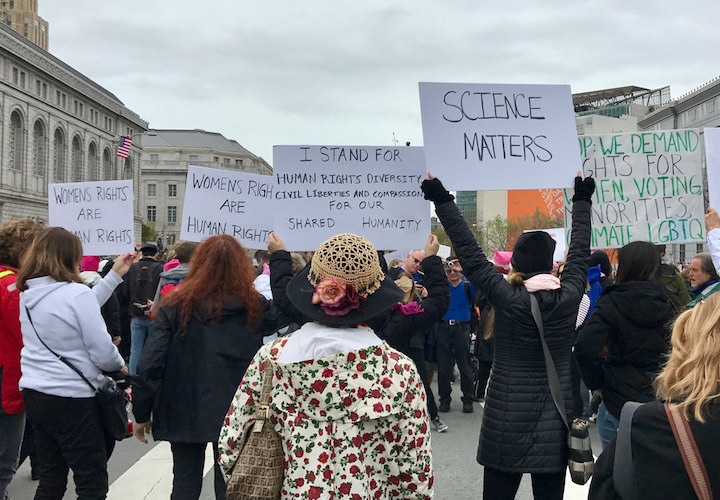80 students to attend March for Science
By Kayla Britt, MS&T Editor
On Apr. 22, scientists and science enthusiasts from a variety of backgrounds and locations will come together to march for science.
The March for Science webpage describes the march as an “international movement . . . taking place because of the simultaneous realization by thousands of people who value science in their lives that staying silent is no longer an option.” Marchers will be occurring both in the U.S. and across the globe.
Among those attending the D.C. march will be Gettysburg students, faculty, and alumni. As news surrounding the march began circulating, members and leaders of various science organizations on campus discussed sending members to attend.
“[The Biosphere exec] was thinking of things to do throughout the semester. Due to the current political climate, it’s an important time for science. We decided it would be a good idea to engage students on our campus and make them aware of what’s going on,” said sophomore Jake Marogi, senate representative for Biosphere, the biology-oriented club on campus.
The Gettysburg Environmental Concerns Organization (GECO) and Biosphere came together and decided to send students in one collective group, instead of sending multiple smaller groups.
“I became involved [in planning the march] because of my involvement with GECO and Biosphere, and I thought that this would be a great opportunity for students [in various science disciplines] to come together for a common cause,” said sophomore Samantha Pfeffer, president of GECO and executive board member of Biosphere.
Leaders of Biosphere, STEMinists, Sceptical Chymists, Society of Physics Students, Pre-Veterinary Club, Democracy Matters, and Psi Chi (psychology honors organization) all met to discuss preparation and logistics for attending the march.
Although initially GECO and Biosphere planned to send 10 to 20 students, the interest grew and as of this publication the total number of attendees stands at 80. The week of Feb. 27, a CUB table was held to allow interested students to sign up and pay a refundable five dollar deposit fee.
Currently, club leaders are working on shirts; GECO members ordered official March for Science Shirts and Biosphere ordered biology-esque shirts. “We want to look like a group from Gettysburg and be seen as unified organizations,” said Pfeffer. “We plan to work on signs later on.”
The group plans to leave early in the morning and return in the evening, although official start and end times for the march have yet to be released.
Many students are attending both on behalf of campus organizations and as individuals.
“I was inspired to go to the march when I heard about the freeze on the EPA and National Park along with other organizations. I am planning on going into Astrophysics, so when I heard that the current administration is censoring posts from groups that don’t support their views and promoting freezes on grants for research that really fired me up,” said sophomore Mikayla Cleaver, who is a member of the Society of Physics Students and STEMinists groups on campus.
For the most part, students feel that there is strong support for science on campus. “I don’t think people always realize how great the science department is at Gettysburg and how supportive they are,” Marogi said.
However, they also feel that the issues that inspired the March for Science directly impact the Gettysburg community.
“Many professors need grants to do their research and with the current administration potentially lowering or cutting funding it could be more difficult for them to pursue new discoveries in their field,” said Cleaver. Marogi added that funding cuts could also impact students looking to go to graduate school or participate in research.
Students are anticipating the march – “I hope that we’ll have a lot of fun. This is my first protest on this scale, with students from a variety of political and ethnic backgrounds coming together because we all agree upon how important science is,” Marogi said.
Cleaver added that she is excited to be surrounded by a crowd of individuals who believe in science, and that she believes the march will go down in history.
“I hope that people will feel like science matters, and that even people who don’t attend understand that science is important for society,” concluded Pfeffer.

